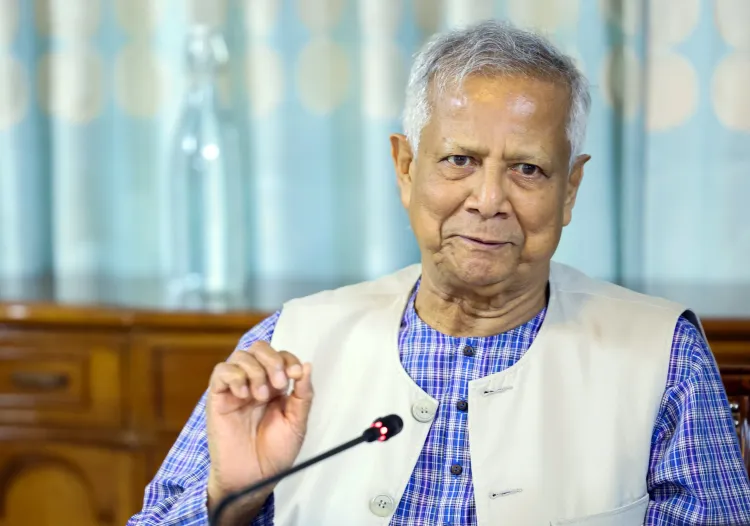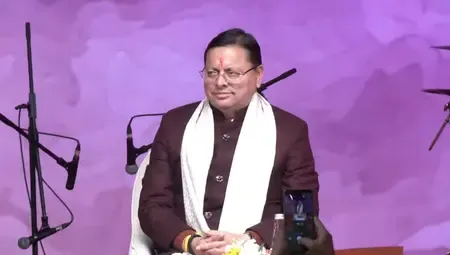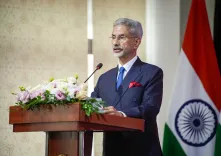Has Awami League Condemned Yunus for His Offensive Remarks on Bangladeshis?

Synopsis
Key Takeaways
- Awami League's strong condemnation of Yunus's remarks.
- Yunus labeled 'fascist' by Awami League leaders.
- Political unrest surrounding the interim government.
- Public protests against Yunus's comments.
- Calls for international recognition of the Awami League's stance.
Dhaka, June 14 (NationPress) The Awami League of Bangladesh has unequivocally denounced the “shameful, insulting, and profoundly offensive” comments made by Chief Advisor Muhammad Yunus of the interim government regarding the citizens of Bangladesh during his recent visit to the United Kingdom.
In a statement issued on Friday, Jahangir Kabir Nanak, a member of the Awami League Praesidium, expressed strong condemnation and protest against Yunus's “offensive” remarks, labeling him a “fascist” following an interview at Chatham House in London.
“Yunus and his associates have unlawfully grasped state power through unconstitutional and undemocratic methods. Since their ascendance, they have manipulated state institutions for personal gain, transforming governance into an illegitimate and unethical endeavor. Acting as puppets for foreign interests, this anti-people faction continues to regard the nation's citizens as mere statistics while executing a series of anti-national acts that undermine the unity of the Bangladeshi populace,” the statement elaborated.
Firmly asserting that Yunus's comments at Chatham House epitomize profound disdain, Nanak argued that individuals like Yunus, who possess “undemocratic and dictatorial” inclinations, lack faith in empowering the people.
When queried on why he does not allow the populace to handle reforms, Yunus retorted, “The people of Bangladesh sell their votes for money.”
“On behalf of the Bangladesh Awami League, we vehemently protest and condemn this vile, dehumanizing, and utterly disrespectful assertion about our nation’s populace. Only anti-state and anti-democratic actors and their accomplices would dare to belittle their own citizens in such a disgraceful fashion,” Nanak stated.
Nanak emphasized that such brazen insults on international stages can only stem from “illegitimate usurpers” like “fascist Yunus.”
“Yunus, in characterizing the populace as corrupt and lacking conscience, has overstepped all bounds. Only a citizen with foreign ties would attempt to elevate himself by disparaging the very people of his homeland,” he articulated in the statement.
“It must be made clear to Yunus — the predatory usurer who has thrived off the suffering of this nation — that the independence and sovereignty of Bangladesh were achieved through the collective will and sacrifices of its people, culminating in the ultimate sacrifice of countless martyrs. To illegally seize that power and insult the citizenry in such a contemptible manner is utterly unacceptable,” the statement further asserted.
The Awami League leader underscored that Yunus's remarks represented a direct attempt to strip the people of their voting rights and to impose control through anti-democratic tactics.
He reiterated that the Awami League is, and always will be, the political entity “closest to the heart of the people,” committed to safeguarding their rights.
“As in the past, we will rise again, united in our struggle, to defeat anti-people forces and restore the rights and dignity of the Bangladeshi people,” he declared.
While accepting the Harmony Award in London from King Charles III, prominent Bangladeshi journalist Salah Uddin Shoaib Choudhury criticized Yunus, claiming he exploited the King to “legitimize his cruel Islamist-jihadist tyranny.”
“King Charles III presented the so-called Harmony Award to several individuals, including Muhammad Yunus, in a private event at Buckingham Palace lasting less than 20 minutes. Subsequently, Yunus's disinformation campaign, led by Shafiqul Alam, overwhelmed Bangladeshi media with their habitual propaganda, falsely claiming that King Charles III had a ‘one-on-one meeting’ with Yunus before the award presentation,” Choudhury posted on X.
Moreover, in a significant diplomatic slight, British Prime Minister Keir Starmer reportedly declined to meet Yunus during his UK visit.
While local media in Bangladesh expressed enthusiasm for Yunus's UK trip, widely promoting a potential meeting with the British Prime Minister, Yunus admitted in an interview with a British newspaper that Starmer had not agreed to meet him.
Earlier, hundreds of protesters had gathered outside Heathrow Airport and at a Central London hotel where he was residing upon his London arrival. Carrying black flags and banners — many of which proclaimed “Yunus is a killer of freedom fighters of the Liberation War” — protestors vociferously chanted slogans such as “Go back, Yunus,” branding him a “promoter of militancy and radicalism” in Bangladesh.
Numerous eyewitnesses reported that demonstrators — primarily from the Awami League, many of whom have fled the country since Yunus's rise to power 10 months ago — even hurled shoes and eggs at Yunus's convoy while it traveled from the airport to the hotel.
Additionally, a formal letter from the Awami League's UK branch was dispatched to Downing Street, the Speaker of the House of Commons, the King's Foundation, and the Commonwealth Secretariat, urging British officials to refrain from recognizing the Yunus administration.










